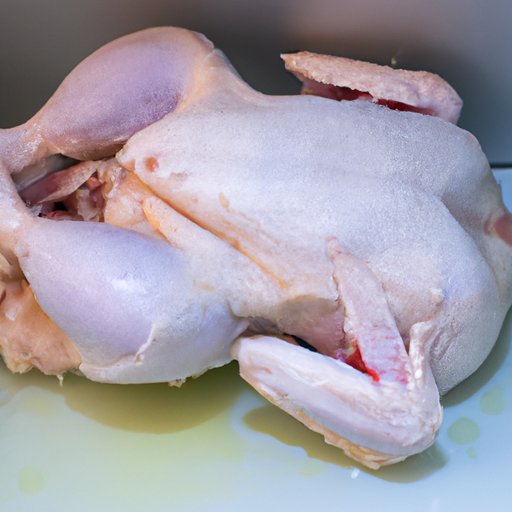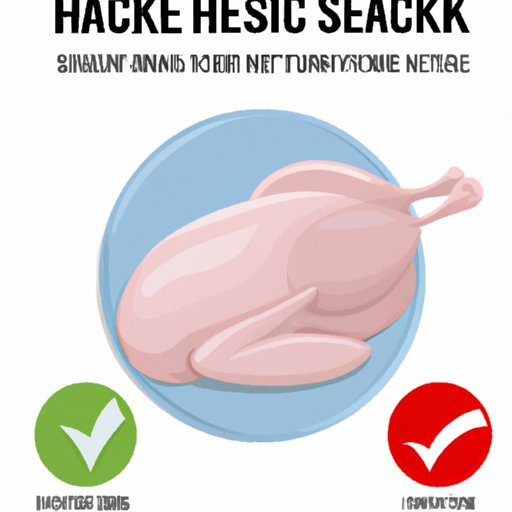
Introduction
Storing raw chicken properly is essential to keep it safe for consumption. Improper storage can lead to foodborne illnesses and other health risks. This article provides an in-depth guide on how long you can leave raw chicken in the fridge, offering tips for proper storage and ways to minimize food waste.

The Importance of Storing Raw Chicken Properly: A Guide to Refrigerator Storage Time Limits
Raw chicken contains harmful bacteria such as Salmonella and E. coli, which can cause food poisoning if not cooked properly. To prevent the growth of bacteria, it is essential to store raw chicken at the proper temperature in the fridge.
The recommended storage time for raw chicken in the fridge is between 1-2 days. After that, the chicken should be cooked or frozen to prevent spoilage.
How to Safely Store Raw Chicken in the Fridge
The first step in safely storing raw chicken in the fridge is to make sure the temperature is set below 40°F. When storing chicken, it’s important to keep it in the coldest part of the refrigerator, which is usually the bottom shelf.
Chicken should be stored in a sealed container or wrapped in plastic wrap to prevent cross-contamination with other foods. It’s also essential to label the chicken with the date it was stored to make sure it is used within the recommended time frame.
Can Raw Chicken be Left in the Refrigerator for More than 48 Hours?
While it is not recommended to store raw chicken in the fridge for longer than 48 hours, it is not always unsafe to do so. The length of time that raw chicken can be stored in the fridge depends on several factors, including the initial quality of the chicken, the storage temperature, and the hygiene conditions in your kitchen.
If you are unsure about the freshness of your raw chicken, it’s best to err on the side of caution and discard it to prevent any health risks.
The Risks of Storing Raw Chicken in the Fridge for Too Long
Leaving raw chicken in the fridge for too long can pose several health risks, including food poisoning. Symptoms of food poisoning from raw chicken can range from mild stomach discomfort to more severe symptoms such as vomiting and diarrhea.
It’s essential to monitor the length of time that raw chicken is stored in the fridge to minimize the risk of foodborne illness and ensure that the chicken is safe to eat.
Tips for Reducing Food Waste: Proper Storage of Raw Chicken in the Fridge
To avoid wasting food, it’s important to plan meals and buy only what you need. When storing raw chicken, it’s essential to portion it out into individual servings to avoid thawing more than needed. Chicken can be cooked and then frozen for later use to minimize waste.
How to Avoid Food Poisoning from Raw Chicken: Best Practices for Storing Chicken in the Fridge
The best practices for storing raw chicken in the fridge include keeping it in the coldest part of the refrigerator and storing it in a sealed container to prevent cross-contamination. It’s also essential to wash your hands and all cooking surfaces that come into contact with raw chicken to prevent the spread of bacteria.
Cooking chicken to the proper internal temperature of 165°F is also critical to reduce the risk of foodborne illness.
How to Tell if Raw Chicken has Gone Bad in the Fridge
There are several ways to determine if raw chicken has gone bad. The first is to check for any changes in color or texture, such as a slimy or sticky film on the surface of the chicken. Another sign that raw chicken has gone bad is a foul odor or a sour smell coming from the chicken.
If you suspect that your raw chicken has gone bad, it’s best to discard it to prevent any health risks.
Conclusion
Proper storage and handling of raw chicken is essential to prevent foodborne illnesses and ensure that the chicken is safe for consumption. By following the recommended refrigerator storage time limits, storing chicken in a sealed container, and cooking it to the proper internal temperature, you can reduce the risk of food poisoning and enjoy delicious, safe meals.




